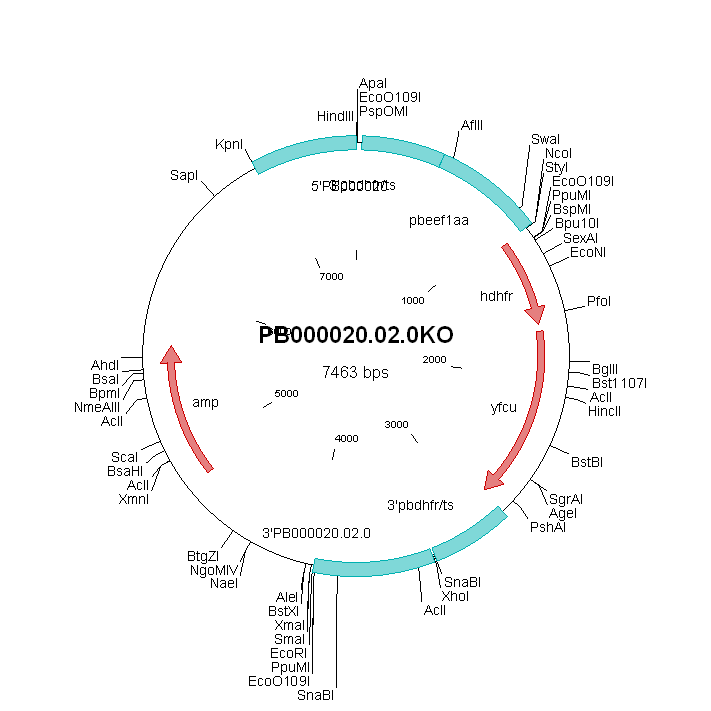SummaryRMgm-492
|
||||||||
 *RMgm-492
*RMgm-492| Successful modification | The parasite was generated by the genetic modification |
| The mutant contains the following genetic modification(s) | Gene disruption |
| Reference (PubMed-PMID number) |
Reference 1 (PMID number) : 22184632 |
| MR4 number | |
| top of page | |
| Parent parasite used to introduce the genetic modification | |
| Rodent Malaria Parasite | P. berghei |
| Parent strain/line | P. berghei ANKA |
| Name parent line/clone | P. berghei ANKA cl15cy1 |
| Other information parent line | A reference wild type clone from the ANKA strain of P. berghei (PubMed: PMID: 17406255). |
| top of page | |
| The mutant parasite was generated by | |
| Name PI/Researcher | J. Fonager, E.M. Pasini, C.J. Janse, B.M Franke-Fayard |
| Name Group/Department | Leiden Malaria Research Group |
| Name Institute | Leiden University Medical Center (LUMC) |
| City | Leiden |
| Country | The Netherlands |
| top of page | |
| Name of the mutant parasite | |
| RMgm number | RMgm-492 |
| Principal name | exp. 1488 |
| Alternative name | |
| Standardized name | |
| Is the mutant parasite cloned after genetic modification | No |
| top of page | |
| Phenotype | |
| Asexual blood stage | Not different from wild type |
| Gametocyte/Gamete | Not tested |
| Fertilization and ookinete | Not tested |
| Oocyst | Not tested |
| Sporozoite | Not tested |
| Liver stage | Not tested |
| Additional remarks phenotype | A pyrimethamine-resistant parasite population was selected after transfection with a construct for targeted gene disruption by double cross-over homologous recombination. The primers of the two target sequences of the gene are provided below. The genotype of the parasites has not been analysed in detail. The phenotype of the selected parasite population/cloned lines has not been analysed in detail. The gene has been selected for targeted gene disruption based on its presence in a proteome of membranes of infected red blood cells
|
 Disrupted: Mutant parasite with a disrupted gene
Disrupted: Mutant parasite with a disrupted gene| top of page | |||||||||||||||||||||||||
| Details of the target gene | |||||||||||||||||||||||||
| Gene Model of Rodent Parasite | PBANKA_1038700 | ||||||||||||||||||||||||
| Gene Model P. falciparum ortholog | PF3D7_1403300 | ||||||||||||||||||||||||
| Gene product | conserved Plasmodium protein, unknown function | ||||||||||||||||||||||||
| Gene product: Alternative name | |||||||||||||||||||||||||
| top of page | |||||||||||||||||||||||||
| Details of the genetic modification | |||||||||||||||||||||||||
| Inducable system used | No | ||||||||||||||||||||||||
| Additional remarks inducable system | |||||||||||||||||||||||||
| Type of plasmid/construct used | Plasmid double cross-over | ||||||||||||||||||||||||
| PlasmoGEM (Sanger) construct/vector used | No | ||||||||||||||||||||||||
| Modified PlasmoGEM construct/vector used | No | ||||||||||||||||||||||||
| Plasmid/construct map |
 | ||||||||||||||||||||||||
| Plasmid/construct sequence |
  AGCTTGGGCCCCCGCGGTGGCGGCCGCTCTAGCTTTGATCCCGTTTTTCTTACTTATATA
| ||||||||||||||||||||||||
| Restriction sites to linearize plasmid | KpnI/EcoRI | ||||||||||||||||||||||||
| Partial or complete disruption of the gene | Unknown | ||||||||||||||||||||||||
| Additional remarks partial/complete disruption | |||||||||||||||||||||||||
| Selectable marker used to select the mutant parasite | tgdhfr | ||||||||||||||||||||||||
| Promoter of the selectable marker | eef1a | ||||||||||||||||||||||||
| Selection (positive) procedure | pyrimethamine | ||||||||||||||||||||||||
| Selection (negative) procedure | No | ||||||||||||||||||||||||
| Additional remarks genetic modification | |||||||||||||||||||||||||
| Additional remarks selection procedure | |||||||||||||||||||||||||
|
Primer information: Primers used for amplification of the target sequences
 Primer information: Primers used for amplification of the target sequences

| |||||||||||||||||||||||||
| top of page | |||||||||||||||||||||||||


